- Home
- Will Hobbs
Never Say Die Page 3
Never Say Die Read online
Page 3
At school, the talk about “Nick’s bear” was starting to die down. With only ten days left before we were out for the summer, there was a lot going on. I went back to living under the radar.
5
I’M NOT THERE YET
It caught me by surprise when Ryan emailed on the twenty-first of May to say he was already packing his pickup with his river gear. He was going to take two weeks for the driving trip from Arizona to Inuvik. The town of Inuvik sits forty miles east of us, on the other side of the Mackenzie River delta. It’s got three thousand people and is way more modern than we are. You can actually drive to Inuvik from wherever, which is fairly incredible if you get out a map and check out its location. Other than Fort McPherson, on the road to Inuvik, there isn’t another town above the Arctic Circle in all of Canada that you can drive to.
Ryan’s email said he would be arriving in Inuvik a week before flying out with a bush pilot into the Yukon Territory and the headwaters of the Firth River on June 15. He was hoping, before he got serious about shopping and the rest of what he needed to do in Inuvik, to spend about three days in Aklavik. He said he had already looked into chartering a flight to our airstrip. He’d found Daadzii Lodge on the internet, and would be staying there.
Holy smoke, I thought, he’s going to come here, spend three days here, right in Aklavik?
There’s only one word to describe my reaction: dread.
My eyes darted back to the email. He explained that it would really help him with the research he needed to do for his article if he could interview hunters in Aklavik. He was especially interested in what our hunters would have to say about climate change and the Porcupine caribou herd, and whether climate change was affecting the whaling we did from our summer encampment at Shingle Point.
I about hit the panic button. Oh great, I thought. This is just what I need. All the hunters in Aklavik looking at me like, Thanks a lot. All the kids I’d grown up with looking at me differently than they had before. I could hear them talking. “Did you know that Nick Thrasher has a brother, right here in Aklavik?” “No way, who is he?” “The white guy who flew in this morning.” “What’s he like?” “Just what you’d expect. He’s going all around town asking people the usual dumb questions, like ‘Do you hunt?’”
This much I knew right away: If my brother came to Aklavik before his river trip, whether or not I went on it with him, I was going to have to dig a very deep hole to keep from dying of embarrassment.
I emailed him right back and told him “some other time.” With my grandfather dying, my family couldn’t have a guest in the village, even if he was staying at Daadzii Lodge.
Ryan emailed back and said he completely understood. He was being really cool about this, said he’d spend the extra days in Inuvik instead. He was still hoping I could come on the trip.
I see your phones are just landlines in Aklavik, no cell service. Call me at the Mackenzie Hotel in Inuvik anytime in the week before the trip or leave a message. We can work out shopping details then. I honor your feelings for your grandfather. If I don’t see you, here’s hoping the not-too-distant future will bring us together.
I was so up and down and all over the place with my feelings. I wondered if I had made a mistake telling him he couldn’t come to Aklavik. No, I still couldn’t picture it.
May turned to June. School was over, the bugs were out, and the sun was up twenty-four hours a day. Ryan was on the road somewhere in his pickup with his rafting gear and camera stuff. My mother was home from Yellowknife, and Jonah was somehow still hanging on. The skin on his gaunt face was papery thin.
I was visiting my grandfather nearly every day. I told him about the fish I was catching, the birds I was shooting, the muskrats I was trapping, and the moose I’d been lucky enough to get. The bull was wading one of the countless small streams that meander through the delta. Jonah was delighted with the organ meat. He still didn’t know anything about Ryan’s letter and the Firth River trip he had offered me.
The head nurse at the clinic in Aklavik had recently suggested to my grandfather that he might be more comfortable, as she put it, at the new regional hospital in Inuvik. Jonah waved that off without even having to think about it. My grandfather wanted “to go to the other side,” as he put it, at home in Aklavik.
With only a week to go before my brother’s date with the bush pilot, my mother said maybe I should reconsider about going on the trip. “I have a feeling this trip is going to open some doors for you. Jonah will understand. I think he would want you to go.”
“You’re probably right about that,” I said. “I just can’t.”
My mother gave me a hug and said she was proud of me. She told me I had been a big part of her father’s life. “You haven’t told your brother yet that you’re not going, have you?”
“Not yet,” I said. “I guess I will pretty soon.”
The day after that, during my visit with Jonah, after we’d been talking about some of our adventures on the sea ice, he came out of a lull in the conversation with this: “One of my biggest regrets, Nick, is that I never took you way back into the mountains up the Firth River. I was only there one time myself, a long, long time ago. But oh my, so pretty—it was something to see. Hunter’s paradise. Saw so many caribou all at once, well, they covered the valley and the mountainsides far as my eyes could see.”
“That was something, Grampa. I hope to see it someday.”
He gave me a look and said, “I think you should, sooner rather than later.”
I could tell that he knew. “Who told you?”
“Your mother.”
“Hmmm … she wasn’t supposed to.”
“Well, it’s hard to argue with a mother’s instincts. I’m glad I found out.”
“But I want to be with you. A month is way too long…. I’d even miss the beginning of the whaling season at the coast.”
“Your mother and your aunt can run the motorboat and open up the cabin by themselves. You can catch a ride with somebody soon as you’re back.”
“True, but I’ve been thinking anyway that my brother’s trip is going to be a bust. He wants to take pictures of huge numbers of caribou, like you saw back in the day, but it’s been years since anybody’s seen that.”
“Could still happen. If big numbers are still out there to be seen, he picked the right place to go look. He also picked the right time. The cows and their calves will be migrating east out of the calving grounds in Alaska by then, and the bulls will be joined up with them after their own migration. You never know, he might get lucky.”
I reached for another excuse. “I … I’m not sure I even want to get to know him. He’s just a stranger.”
“He’s also your brother. That’s something special.”
“I don’t want to be disappointed. He’s obviously an environmentalist, probably the kind who doesn’t approve of us hunting whales and bears. When he talks about shooting caribou, it’s with a camera. What if we don’t get along?”
Jonah reached out his hand and placed it on mine. “Only one way to find out, Nick.”
A tear or two escaped my eyes. “Here’s how it is, Grampa. I want to be here with you till the end. Is that so wrong? I couldn’t handle it way out there for a whole month. I want to be here.”
He squeezed my hand hard as he could, which wasn’t very hard. And he chuckled. “So that’s it! That’s what this is all about.”
“Well, sure.”
“Listen carefully, Nick. There comes a time when the caribou won’t even try to run from the wolf, and the moose won’t run from the bear. That’s when they stand, and let death take them. They finally accept it. I’m not there yet. I’ve still got the fight in me. I want to hear your stories when you get back, and that will give me all the reason in the world to hang on. After that, the wolf or the bear can have me, whichever gets here first.”
I couldn’t help myself—tears filled my eyes, and I hugged Jonah ever so gently.
“Good,” he
said. “Now go.”
An hour later I called up the Mackenzie Hotel in Inuvik. The lady said Ryan Powers was out of his room. Did I want to leave a message?
This was better than having to talk to him. The message I left said I would meet up with him at the hotel sometime on the fourteenth. He could go ahead and buy groceries for two.
6
THE EXPERTS ARE STUNNED
Real early on the morning of the fourteenth of June I threw my stuff into the boat—a big duffel bag, a small backpack, and my rifle in its hard plastic case. My mom stepped into the passenger seat next to me and we headed upriver. There was a lot to talk about, but the engine noise made that impossible.
At full throttle, it took hours to reach the Mackenzie River ferry at the head of the delta. I unloaded my stuff quickly. My mom and I were saying good-bye when she surprised me. “We’ve hardly ever talked about your father. Whenever I tried, it made you uncomfortable.”
“I know,” I admitted.
“Because you never wanted to think about that part of yourself.”
“You’re right. In my heart, I’m a hundred percent Inuit.”
“You’re as fine an Inuk as they come. I just wanted to say that your father was an amazing person. I’ve never met anybody like him before or since. Smart, kind, funny, and so full of life.”
“Good, I’m glad.”
“You never got to know him, but give your brother a chance, that’s all I wanted to say. Don’t go all silent aboriginal on him, okay?”
I cracked up. “Sure, but what if he rubs me the wrong way right off the bat?”
“If he seems like a good person, you can meet him halfway. If he doesn’t, give me a call and I’ll come and get you right here, tomorrow.”
We said some other things, mostly about Jonah. Then we hugged and said good-bye. My mom got behind the wheel and hit the starter. With a wave she was headed downriver to join my aunt and my grandmother at Jonah’s bedside.
I eyeballed the line of vehicles waiting to get on the ferry. Most of them had come 450 miles up the gravel highway from the paved highway outside of Dawson. They were pretty well caked with mud. The tourists were staying inside their vehicles. The day was warm and buggy. Here came the ferry returning from the eastern shore of the mile-wide Mackenzie.
I walked onto the ferry, scouting each vehicle as they came aboard. Usually you can catch a ride with locals from nearby Fort McPherson who are on their way into Inuvik for the day. A Gwich’in guy helped me out. His name was James and he was on his way to a doctor’s appointment. He told me to throw my stuff in the back of his truck and hop in.
The drive to Inuvik took about ninety minutes. James filled my ear with how lousy the economy was. He used to have plenty of work when the oil and gas exploration was booming, but ever since the world economy went sour in 2008, he hadn’t been able to find any kind of a job. He’d had to go back to subsistence living. “If we didn’t have the fall caribou hunt,” he said, “we’d be in a really bad way.”
“Same goes for Aklavik,” I told him.
I had James drop me by the igloo-shaped church in the center of town, a few minutes’ walk from the Mackenzie Hotel. It was early afternoon and the sun was blazing. I told myself that it would be cooler on the Firth River. It was time to think positive about meeting my brother.
I half expected to find Ryan waiting as I lugged my stuff into the lobby of the hotel. He wasn’t there, but had left a message. Ryan had paid for a second room for me that night. I should go ahead and move in, then look for him at Boreal Books or the office of Ivvavik National Park.
I tried the bookstore first. There was a flyer on the door with Ryan’s name and the cover of his new book, America’s Grandest Wild Places. The flyer said he would be signing and visiting from noon until two. I had missed him by fifteen minutes.
I left the bookstore and headed down Mackenzie Avenue. Through the window of the Parks Canada office I saw a tall young man talking with a short park warden in uniform. It took me a couple of seconds to identify the taller one as Ryan. He had the dark, wavy hair I remembered from his website. With the full beard he was wearing now, it was harder to see the resemblance to me.
I got all jumpy and walked away before either one noticed me looking in. I could always tell my mother and Jonah that he rubbed me the wrong way.
Well, I couldn’t live with chickening out. I headed back for the Parks Canada office. Ryan and the park warden were having such an intense conversation about the poster on the wall—a big map of the Mackenzie delta—they didn’t notice me slip inside. I sidled behind a partition with a display about Ivvavik National Park.
“After the Mississippi,” the warden was saying, “the Mackenzie is the second-biggest river in North America.”
“Here’s where I took the ferry across the river.”
“Correct. Downstream, here’s Point Separation, where the river divides into three channels and the delta begins. The Mackenzie’s delta—twelfth biggest in the world—is a hundred miles long and generally forty miles wide.”
“A wonder of the world to be sure,” my brother marveled. “What a maze. Thousands of islands and connecting streams, and so many lakes—any idea how many?”
“Roughly twenty-five thousand.”
“Here’s Aklavik! I was hoping to get there—it didn’t work out. When was it first settled?”
“Early in the twentieth century during the rush for the white fur of the Arctic fox. Inuit from the coast and Indians from upriver began to settle around a new trading post. It became the biggest settlement in Canada’s northwest Arctic. There were more than sixteen hundred people there in the 1950s when the government decided to shut it down. They built Inuvik to replace it.”
“How come?”
“Aklavik was prone to flooding. Where we’re standing right now is well above the Mackenzie’s floodplain. Inuvik was a modern miracle, but when the time to move came, half of the people in Aklavik said thanks but no thanks—we’re staying put. What the government could never replace was their traditional subsistence way of life. That’s where their motto comes from—‘Never Say Die.’”
“That goes in my article for sure. I take it the hunting and fishing were better over there?”
“Yes, and Aklavik’s location allowed the Inuit to keep sealing and whaling on the coast.”
“I was hoping to visit their summer encampment at Shingle Point after my trip. Any chance of photographing a polar bear there?”
“Not likely—too many people. Half of Aklavik is there during July. Your chances of photographing barren-ground grizzlies during your Firth River trip are much greater. The grizzlies follow the caribou. Keep your eyes out for the hybrid of the two.”
“Come again, Dave? A hybrid? Hybrid bear?”
I had been following this conversation real close as it was, but now I was all ears.
“A polar bear and a grizzly have mated,” the park warden said. “The bear experts are stunned.”
“Has it ever happened before?”
“A couple of times, they’re saying, in zoos. Canada’s polar bear expert, Roger McKeon, is guessing that the changing climate is behind the appearance of this first one in the wild. We know that grizzlies have crossed on the sea ice to some of the islands in the high Arctic—why is anybody’s guess. Personally, I think the two species mated up there. It took years for the hybrid cub to grow up and find its way down here. If it was born down here where there’s a lot more hunters around, it would’ve been noticed before it got to be full-grown.”
“You said keep your eye out for the hybrid…. If it’s alive, how are they so sure it’s a cross between grizzly and polar bear?”
“They even know the gender of the parents—male grizzly, female polar bear. The DNA was from hair collected at the scene of a bear encounter that a hunter from Aklavik had on the western side of the delta last month.”
“Man, would I love to interview that hunter for my article. That must’ve been a strange-
looking bear.”
“I hear the hunter was a teenager.”
“What is the hybrid bear being called? They must have given it a name.”
“The Canadian Wildlife Service has floated two possibilities. One is nanulak, the other is grolar bear. Nanulak is a combination of the Inuit names for the two different bears. Grolar bear, as you’ve already guessed, is a combination of grizzly bear and polar bear. Grolar bear is the one that seems to be catching on.”
“I vote for grolar bear,” I said as I stepped from behind the partition.
7
PURE FOOLISHNESS
Ryan looked confused at first—he’d never even seen a picture of me. Real quick, he broke into a big smile and called my name. He was tall—more than six feet. He strode across the room and reached out his hand for mine. His eyes were greenish, flecked with brown.
Ryan introduced me—to the park warden’s surprise—as his brother, Nick Powers.
“Nick Thrasher,” I corrected him.
“I didn’t realize,” Ryan said, and explained to the park warden that I was from Aklavik and was going to run the Firth River with him.
I wanted to hear more about the bear. I asked the park warden, whose name was Dave Curry, how long he had known about the DNA test.
“We just heard about the results late yesterday,” Curry said. “They haven’t been released to the press yet.”
“Say, Nick,” my brother said, “I wonder if you might know the teenager who had the encounter with the grolar bear. You would’ve heard about it. You know that kid?”
“I do,” I said. “It was me.”
You can imagine their faces, especially my brother’s. “Could you tell it was a hybrid?”
“That looked pretty obvious.”
“Could you tell us about the encounter?”
I kept it short, told it pretty flat, and left out a lot. I could tell that my brother had no end of questions but he held back. So did the park warden. I’d already told the bear biologist who came to talk to me how crazy-aggressive the bear was.

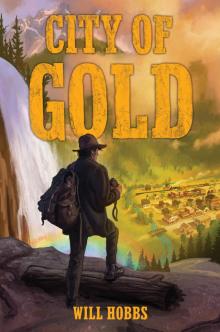 City of Gold
City of Gold Kokopelli's Flute
Kokopelli's Flute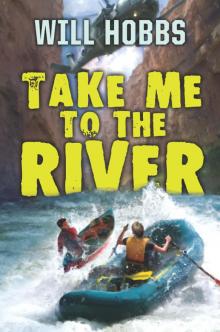 Take Me to the River
Take Me to the River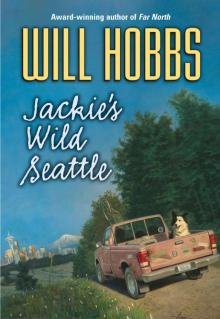 Jackie's Wild Seattle
Jackie's Wild Seattle The Maze
The Maze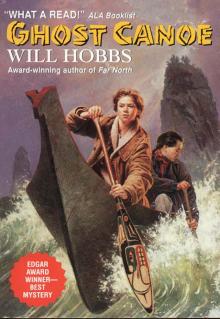 Ghost Canoe
Ghost Canoe Never Say Die
Never Say Die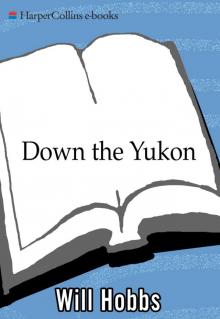 Down the Yukon
Down the Yukon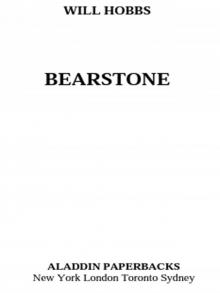 Bearstone
Bearstone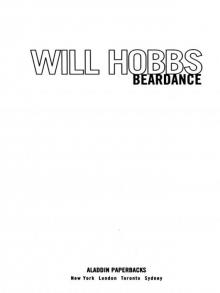 Beardance
Beardance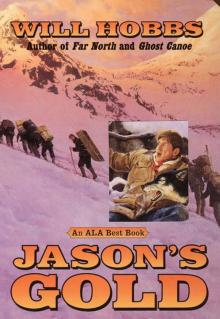 Jason's Gold
Jason's Gold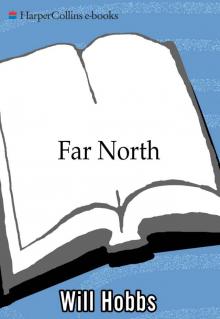 Far North
Far North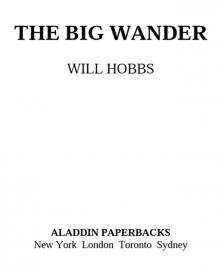 The Big Wander
The Big Wander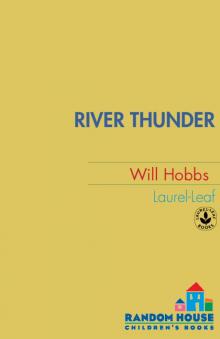 River Thunder
River Thunder Downriver
Downriver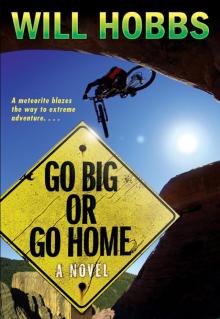 Go Big or Go Home
Go Big or Go Home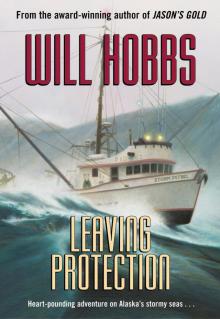 Leaving Protection
Leaving Protection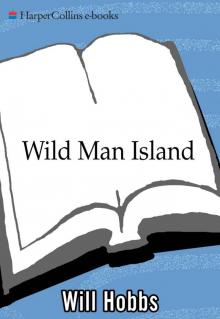 Wild Man Island
Wild Man Island